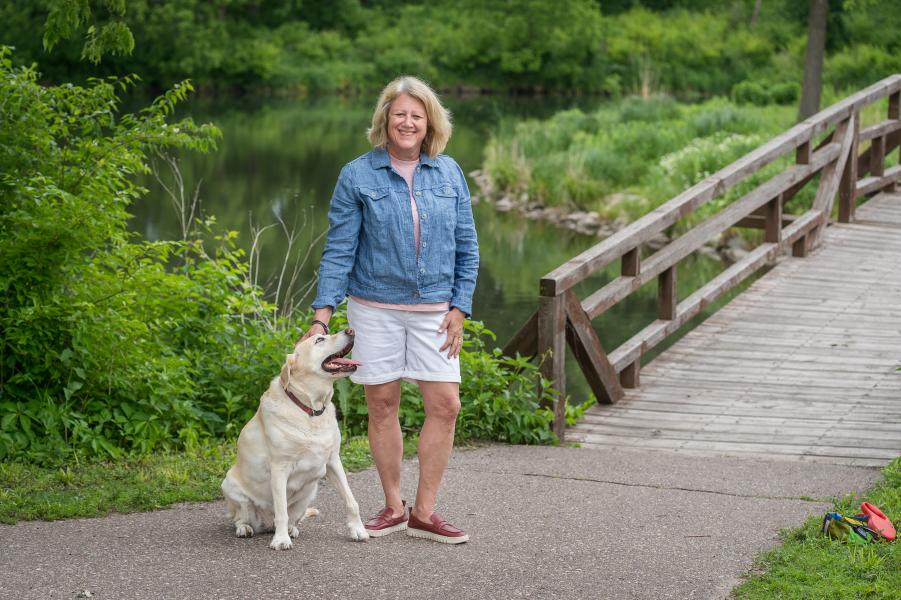Katy Hargis

Katy Hargis felt all the twists and turns.
Katy has a history of diverticulitis, where pockets in the colon get inflamed or infected.
She also has a high pain tolerance, so she gutted it out as the pain built up slowly, flaring and fading over four months. Then one day “I couldn’t take it anymore, it was so painful,” Katy says. She went to the ED.
Her condition had all the signs of colon cancer. But surgeon Katya Ericson, MD didn’t think it was cancer. “I held onto those words,” Katy says.
Dr. Ericson performed a flex sigmoidoscopy to examine a portion of the colon. The diagnosis: Diverticulitis, with massive scarring that wasn’t allowing anything to pass, leaving the intestines increasingly stopped up. Katy’s colon was in crisis, trying to repair itself by walling off the diverticulitis infection. The damage spread into Katy’s abdomen and affected other organs, including a fallopian tube that was stuck to her abdomen wall.
Katy needed surgery.
“Dr. Ericson was so great, with the right combination of truth, directness, and empathy,” Katy says. “She told me, ‘I’m here with you on this journey, and I’ll help you any way that I can.’”
What started as a laparoscopic procedure to remove the infected portion of Katy’s colon turned into a nine-hour open surgery. “It was just a mess,” Katy says. “When I woke up, I was in CCU with a colostomy bag. It dropped me on my head.”
Katy had an ileostomy, a surgical procedure that creates an opening for the colon through the abdomen, where stool comes out and is collected in a bag.
Katy spent a week in CCU with one-to-one nursing care. “For someone active and fit, it was hard to be the one who needed a gait belt to walk to the bathroom,” Katy says. “The nursing was phenomenal. I felt in really good hands.”
The ileostomy would serve for about five months while Katy’s colon healed, and the healthy parts of her colon could be reconnected through surgery. In the meantime, the Wound Healing Center took care of Katy, with frequent visits to clean and manage the stoma (the opening in her abdomen) and collection bag. “The Wound Healing Center was such a great resource,” Katy says. “I really struggled at the beginning, and they kept me going physically and mentally.”
Especially Jillian Simon, FNP, CWON – a certified wound ostomy nurse. “Jillian saved me mentally,” Katy says. “She was always positive.”
When it was time for surgery to reconnect the colon, “I went into it thinking it wouldn’t be a big deal,” Katy recalls. “I underestimated that I had just barely recovered from the first surgery.”
Then an infection complicated matters. The wound needed to be drained. “Dr. Ericson was straightforward that it was going to hurt, and it did,” Katy recalls. “And she was also empathetic: She said, ‘We’re going to fix this.’”
They did.
Katy is back on her feet, and training again at the Y to rebuild her upper body strength. “I’m feeling back to normal,” she smiles.
Her advice for others: “Listen to your body. I didn’t listen. I thought I could overcome it by sheer power of will, and fix myself. For many months my body was trying to tell me I was sick and I wouldn’t listen to it.”
Katy adds: “Be grateful that we have these people and support systems in our community. When you’re sick, you have them here.”
When a friend of Katy’s was advised to see a surgeon in the Twin Cities for colon care, that surgeon sent the friend back to Northfield, to Dr. Ericson – whom he had trained years ago. “It’s easy to assume medical care is better in the Cities, but it’s not,” Katy says.
She appreciates the personal attention at Northfield Hospital, too. “The nursing care is so personal, and it’s such a clean, calm environment,” Katy says. “And they helped me with insurance issues, and set up home delivery of medical supplies.
“We’re lucky to get this level of care at our own community hospital.”
